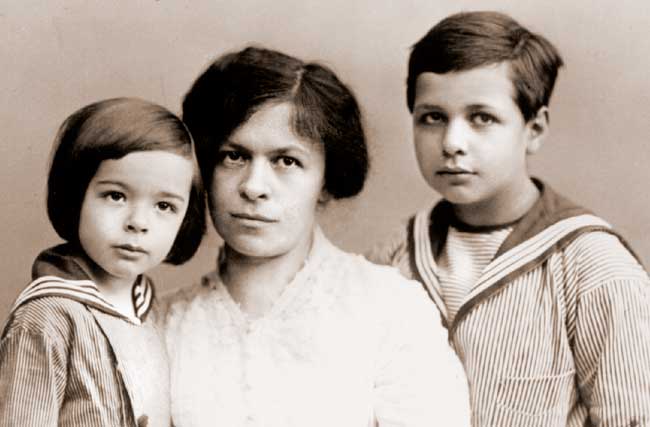Mirjana Stojković-Ivković
Belgrade, Serbia

Mileva Marić was the first wife of Albert Einstein. Although she worked with him for many years, her overall contribution to his success has never been clearly determined. She was born in Serbia in 1875 and had one leg shorter than the other, which caused her to limp. She had a brilliant intellect and graduated in 1890 at a time when Serbia was among the few countries in which girls could attend secondary school. In 1896 she went to study mathematics and physics at the University of Zurich, the only woman to pass its extremely difficult entrance exam.
She was only the fourth woman to have been admitted to the university. Her papers attracted the attention of her professors, and her talent for mathematics and physics was indisputable. She was much admired for her knowledge. An emotional and intellectual relationship between Mileva and Albert began in 1897, when they worked together on the mathematical definition of electromagnetic theories of light. Her first two years of study were successful, but after 1899 her performance at the university declined, and in the summer of the following year, she did not pass the final exams.
Mileva failed the exam again when she discovered that she was pregnant. She was twenty-seven years old in 1902 when she gave birth to a daughter, Liserl, whom she gave up for adoption against her will and who after two years died of typhus. For the rest of her life, she became prone to episodes of depression. Albert and Mileva married in January 1903. They had two sons, Hans Albert (1904) and Eduard (1910).
Mileva was an outstanding student and a candidate for a doctoral dissertation, but there is no indication that she ever graduated. Too, while she may have assisted him in his work, Einstein never stated publicly that she contributed to his ideas. She herself left behind only two saved scientific writings. The first was on analytical mechanics, prepared for Albert Einstein’s lecture in 1910 at the University of Zurich; the second was Mileva’s response to physicist Max Planck’s work on infrared radiation.
Eventually the equal relationship between Mileva and Einstein began to fray. Marital relations worsened, and there were fewer and fewer scientific papers after 1910. Albert became indifferent to her because she withdrew into herself, becoming depressed and no longer cheerful and bright. Their joint intellectual work ended in 1912.
The next depressive episode was when she realized that Albert had fallen in love with his cousin Elsa Berlin. In 1914 he wrote rules of behavior for Mileva, including that she would keep his laundry “in good order”, he would receive three meals “regularly” in his room, and that she would not expect “any intimacy” from him, nor “reproach” him “in any way.” She took these conditions as humiliation and could not accept. Her depression was taking over, but they had young children to take care of. They divorced in 1919.
She then spent two years in a sanatorium, treated for a supposed heart attack, then becoming “paralyzed.” Orthopedists and neurologists could not find the reason for her immobility, and she left the sanatorium without a diagnosis. Also, during her stay in the sanatorium, her younger son who stayed with her had a psychotic attack and tried to strangle her. Yet she always minimized her son’s problems and loved the time when they were together; she was happy. When someone warned her, she would say, “It’s not him who wanted to harm me, but his illness.” Suffering from schizophrenia, he was treated by the most famous psychiatrists of that time: Broiler, Jung, and Freud. Mileva’s own sister suffered from the same disease, and Mileva had further episodes of depression that incapacitated her for days.
Albert married Elsa in 1919. Mileva devoted herself to her children. Albert gave her some of the money from the Nobel Prize but went to live in the United States. From 1933 to 1955, he worked at Princeton University. Mileva died in Zurich in 1948, remembered as a successful woman scientist.
Further reading
- Desanka Trbuhović-Djurić. “In the shadow of Albert Einstein”
- Svenka Savić. “The road to Mileva Marić-Einstein-private letters”
- Djorđe Krstić. “Mileva and Albert Einstein”
- Anđelka Bogdanov. “Five Serbian stars”
- Slavenka Drakulić. “Mileva Einstein-theory of sadness”
- Jasmina Ahmetagić. “The story of Narcissus the abuser”
DR. MIRJANA STOJKOVIĆ-IVKOVIĆ graduated from the Faculty of Medicine in Niš and specialized in psychiatry in Belgrade, where she works as specialist in psychiatry as employee of Serbian Railways.

Leave a Reply